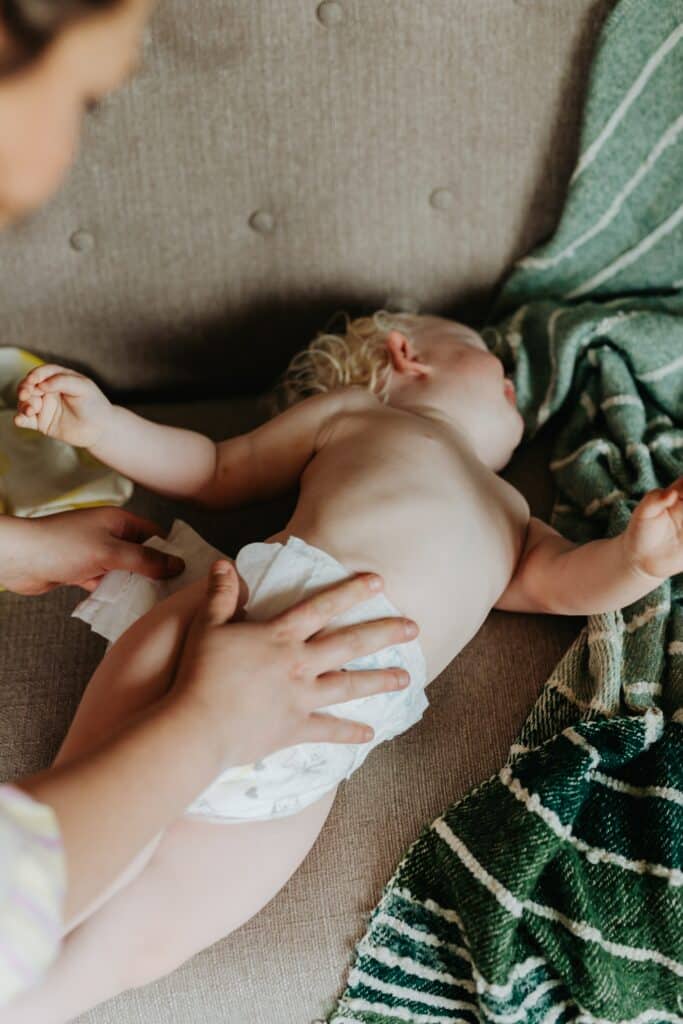It happens in a blink of an eye–suddenly, how to keep baby hands out of diapers becomes a top priority. From taking off their diapers to slinging poop, wandering hands can be a big problem.
It’s normal for babies and toddlers to put their hands in their diapers starting around 12 months. Mitigate this stage by distracting them, changing the diaper quickly, using clothing as a barrier, or even starting potty training.
Keep reading for some insight into why your baby likes to put his hands down his diaper and some tips on keeping it from happening, at least in public.
Table of Contents
Why do babies put their hands in their diapers?
One of the (many) things I was unprepared for when my first child was born was the sheer amount of interest in what was going on inside her diaper. At first, changing time was a challenge because I was still learning the ins and outs of doing it correctly.
Then it was easy because I knew what I was doing and she was very, very interested in her fingers and not paying much attention to me. After that, though, it started getting much more difficult because she liked to either kick or put her hands where I was working (or both).

Babies are interested in everything and spend much of their time exploring and learning, so it should be no surprise when that interest extends to their own bodies.
Although we want our children to learn and grow, it can be very frustrating (and often gross) when that extends to putting their hands down their diapers.
Your baby can start developing the dexterity required to remove simple articles of clothing, like socks and disposable diapers, before their first birthday.
As your baby grows into a toddler, he (or she) will become more interested in what is going on inside the diaper. It is not uncommon for small children to touch themselves and explore their bodies (and diaper contents).
If your baby likes to stick his or her hands down the front of the diaper, it may simply be because they have realized that it feels good.
According to the Mayo Clinic, your toddler may start to display signs of being ready to start potty training as early as 18-24 months. One of those signs is that your child is pulling on or trying to remove his diaper.
This is because he is becoming aware that his discomfort is coming from the wet or soiled diaper.
What does it mean when a baby takes off their diaper?
There are several reasons that your baby might keep taking off his diaper.
- Discomfort – Whether it is because the diaper is too snug, it is rubbing against a diaper rash, or it has become soiled, older babies may try to remove their diapers in order to relieve a general feeling of discomfort.
- Ready to Potty Train – If your toddler makes a habit of removing, or trying to remove, his diaper, especially after soiling it, it may be a sign that he is ready to potty train. At this point, he has associated the feeling of a dirty diaper with your act of changing it and is attempting to do the same.
- Entertainment – Babies can make toys out of just about anything, their diapers included. It is not uncommon for babies to enjoy the sensation of pulling up diaper tabs, perhaps not even realizing it could lead to the diaper falling off.
- Attention – Even if you shower your child with positive attention, it can often feel like he will go out of his way to disobey in order to receive negative attention. Just like babies may bite just to hear someone squeal, they may attempt to remove their diaper to elicit a reaction simply because they think it is funny.

Is it normal for babies to grab their privates?
As adults, it is easy to try and apply our social taboos to children, but it is completely normal and innocent for babies to grab their privates.
Both baby girls and boys may enjoy touching themselves, either because it feels good or simply because they are bored and their genitals are there and interesting.
Toddler is putting hands in poopy diaper
If your toddler has a tendency to put his hands in his poopy diaper, it is probably because he is trying to deal with the discomfort he is feeling.
He may be discovering that he does not like the feeling of the poop in his diaper, or it may be that there is a diaper rash that he can feel developing.
This kind of behavior is dangerous because they might even eat their own poop!
Either way, the soiled hands are usually the result of his attempts to address the issue, and not the ultimate goal.
How to keep toddler hands out of their diaper
Fortunately, when a toddler puts his hands in his diaper, it is usually the byproduct of a primary urge or desire.
If you can figure out why your child is putting his hands in his diaper, you should be able to find an alternative way of satisfying the original urge.
Give them something else to focus on
If your toddler has an awkward tendency to play with himself when being changed in public, you probably want to discourage that behavior without drawing attention to it.
Try keeping a small toy in your diaper bag that your child only plays with during diaper changes.
Make it a game
If your toddler is playing with themselves or their diaper as a way of getting a rise out of you, you may be able to divert that attention with a game. If your child is old enough, you could try occupying him by counting together during changing times.
For us, a game that worked was saying “Pants off hands up!” whenever my son’s hands were getting in the way when we were changing his diaper. He thought it was a hilarious game and it usually bought us enough time to finish up what we were doing.
Change dirty diapers promptly
One of the big reasons a toddler may stick his hands down his diaper is to relieve the feeling of the poop against his butt. Obviously, a better way to solve that problem would be to change diapers promptly after they become soiled.
If you have already picked up on the cues that your toddler is pooping, this may be fairly easy. For example, many toddlers will find a private place to do their business even before they are fully ready to potty train.
As your toddler gets older, you may also be able to teach him to simply alert you when he is ready for a clean diaper, instead of leaving him to his own devices.
Start potty training
Constantly trying to remove a diaper, especially a soiled one, is one of the indicators that a toddler is ready to start potty training. If your child checks several of the boxes and is ready to start potty training, do it!
This will (eventually) help to redirect his desire to remove the diaper to the proper time and place.
Remove the temptation
Sometimes toddlers play with their diapers just because they are bored or at completely inappropriate times. In these cases, it can be helpful to preemptively dress your toddler in an outfit that reduces or completely removes his ability to access his diaper.
Whether that’s a bodysuit under an outfit or a pair of pajamas that zips all the way up, there is a wide selection of clothing options that can help you keep your child’s hands away from his diaper without drawing attention to the issue.

How to keep baby hands out of diapers
It is often more difficult to keep an infant’s hands out of their diapers than it is for an older child. This is typical because a toddler will usually have a practical ultimate goal when they start putting their hands down there, but a smaller baby is mostly just interested in exploring.
Because of this, it can actually be more difficult to train a baby not to play with themselves, especially during diaper change; it can, however, be easier to distract them.
You shouldn’t punish a baby for exploring their body or teach shame regarding their genitals.
Change diaper brand/size
One of the few reasons an infant might be messing with his diaper that isn’t simple exploration and amusement is discomfort. It may be a sign that the waistband is too snug and it is time to go up a diaper size.
If your baby seems to be constantly uncomfortable in his diaper, you may also want to consider a different brand or style, maybe one designed specifically for sensitive skin.
Occupy their hands
Whether you are on the go or at your regular changing station, a tried and true way to keep a baby’s hands out of his diaper during changing time is to give him something else to do with them.
A small rattle or chewy toy is a good option to keep little hands busy – just make sure it’s something easy to clean just in case it doesn’t work!
Distract their attention
If possible, hang a ribbon or decoration just above your changing station. If your baby is busy looking at the fun, exciting thing right above their head, they are less likely to get in trouble in other places.
Just make sure it’s well out of reach and fastened securely so it won’t present a choking hazard.
Create a barrier
Desperate times call for desperate measures, and sometimes you just have to lay your baby down on the floor and wrap your leg over him so he can’t get to his diaper.
If you prefer not to physically restrain your baby in public, you could pick up this portable changing pad that creates both a distraction and a barrier for your baby.
Cover it up
The best way to keep a baby from sticking his hand down his diaper or trying to remove it outside of changing time is to simply keep that from being an option.
Children are more or less nudists if left to their own devices, and it may be cute to let your baby crawl around in nothing but a diaper, but you are better off dressing him in a bodysuit or a zip-up sleep-and-play outfit.
Conclusion
The first time your baby takes off their diaper or slams their hands in poop, you’ll probably be more than a little shocked. Keep in mind it’s a normal developmental stage for all children.
Your best course of action will be to distract your baby during changes and use clothing to make their diaper tapes inaccessible. If your toddler is older and is showing other signs, it might be time to start with toilet learning.










